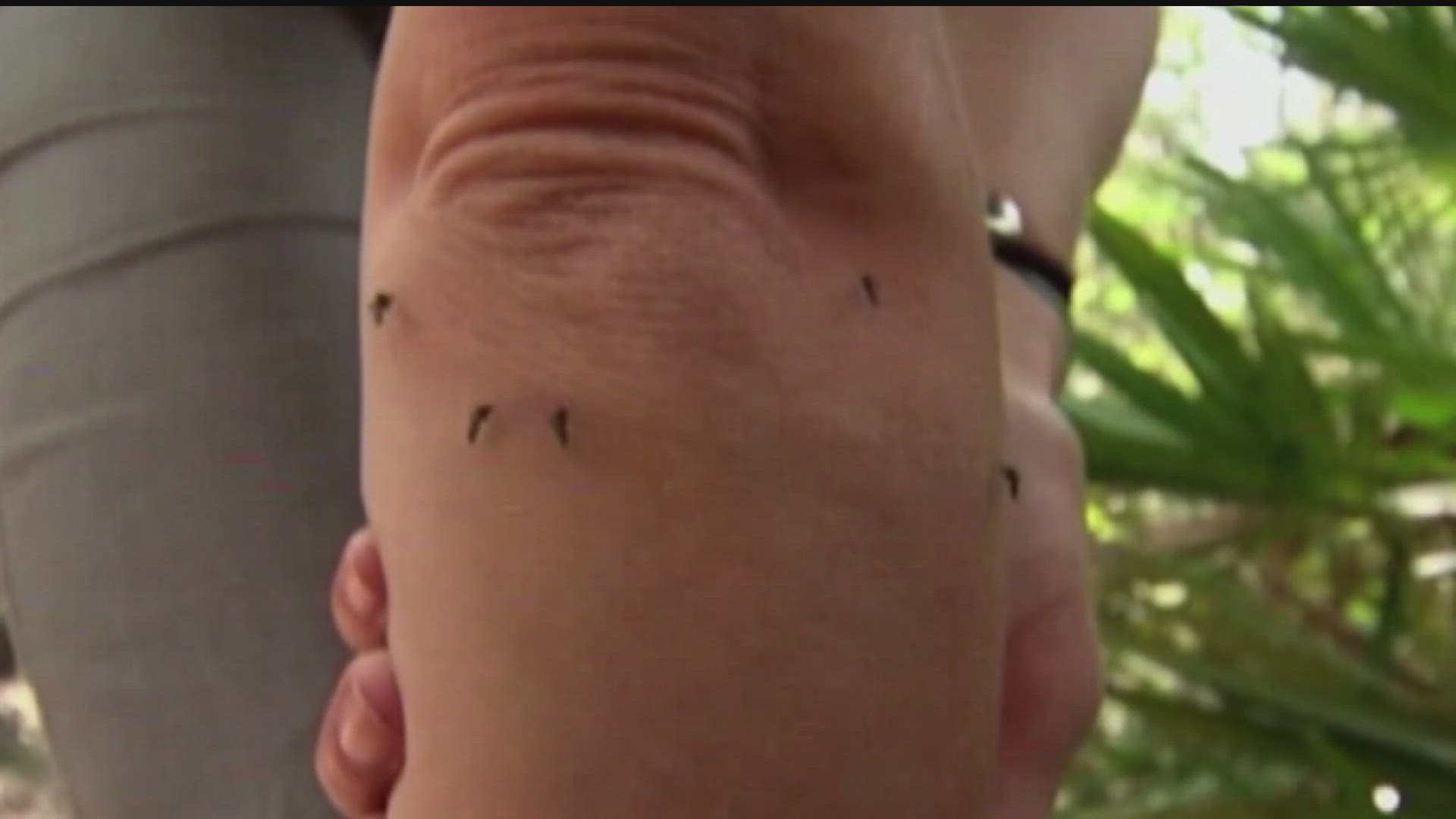MINNEAPOLIS — The first few weeks of unofficial summer in Minnesota have already been a rollercoaster — tornadoes, heat waves, cooldowns and rain... so much rain.
And while the rain undoubtedly helped Minnesota's drought monitor improve it also gave life to an influx of insects — specifically, mosquitoes.
According to the Centers for Disease Control and Prevention (CDC), mosquitoes can spread diseases like malaria, dengue, West Nile virus, yellow fever, Zika and others. The CDC said cases are generally rare in the United States, but it still doesn't hurt to learn how to prevent diseases like these from spreading, and at the very least, avoid those irritating, itchy bites altogether.
Read on for a list of tips to achieve a (nearly) scratch-free summer.
REPELLENT
The CDC recommends using an Environmental Protection Agency (EPA)-registered repellent with one of these ingredients:
- DEET
- Picaridin (known as KBR 3023 and icaridin outside the United States)
- IR3535
- Oil of lemon eucalyptus (OLE)—A plant-derived ingredient
- Para-menthane-diol (PMD)
- 2-undecanone—A plant-derived ingredient
According to CDC officials, EPA-registered products are proven safe and effective, even for pregnant and breastfeeding women.
Guidelines for parents using repellents on their children include:
- Always follow label instructions.
- Do not use products containing OLE or PMD on children under 3 years old
- Do not apply repellent to a child's hands, eyes, mouth, cuts, or irritated skin
- Adults: Apply repellent to your hands and then apply to a child's face
Natural repellents are another option for people trying to keep mosquitoes at bay, but the CDC does warn that non-EPA-registered products have not been evaluated for their effectiveness.
To find a repellent that works for your family, try the EPA's search tool.
CLOTHES
To keep children from getting chomped on, the CDC recommends parents outfit them in clothing that covers their arms and legs, while babies and toddlers in strollers and carriers should be shielded with mosquito netting.
Similarly to children, adults should also try to wear loose-fitting, long-sleeved shirts and pants. The CDC also suggests wearing clothing treated with permethrin, an insecticide that kills mosquitoes, which keeps its protective quality even through several washes.
However, the CDC says it is NOT advised to put permethrin products directly onto the skin.
For more information about permethrin, click here.
KEEP NATURE IN NATURE
Have you ever been driven mad at bedtime by the sound of a mosquito humming somewhere in the dark? Just me?
If you've been there, you know how easy it can be to accidentally let the buzzing bloodsuckers indoors. That's why the CDC also has tips to help you keep mosquitoes where they belong — anywhere but inside.
- Install or repair and use window and door screens
- Close doors, including garage doors. Do not leave doors propped open
- Use air conditioning when possible
- Use an indoor insecticide if you still have mosquitoes in your home after installing and repairing screens
- Hire a pest control professional to treat areas inside your home
... BUT OUT OF YOUR YARD
It's nature's world and we're just living in it.
So even though mosquitoes can be a pain, it's important to know they're still important to our overall ecosystem — but that doesn't mean you can't try to prevent them from hunting unsuspecting victims in your yard.
The CDC recommends tackling these tips to help treat their properties:
- Remove standing water where mosquitoes lay eggs
- Once a week, empty and scrub, turn over, cover, or throw out any items that hold water like tires, buckets, planters, toys, pools, birdbaths, flowerpot saucers, or trash containers. Mosquitoes lay eggs near water.
- Tightly cover water storage containers (buckets, cisterns, rain barrels) so mosquitoes cannot get inside to lay eggs.
- For containers without lids, use wire mesh with holes smaller than an adult mosquito.
You can scratch your itch for more information and tips about mosquito prevention from the CDC here.
RELATED: How to know if you have Lyme Disease
WATCH MORE ON KARE 11+
Download the free KARE 11+ app for Roku, Fire TV, Apple TV and other smart TV platforms to watch more from KARE 11 anytime! The KARE 11+ app includes live streams of all of KARE 11's newscasts. You'll also find on-demand replays of newscasts; the latest from KARE 11 Investigates, Breaking the News and the Land of 10,000 Stories; exclusive programs like Verify and HeartThreads; and Minnesota sports talk from our partners at Locked On Minnesota.
- Add KARE 11+ on Roku here or by searching for KARE 11 in the Roku Channel Store.
- Add KARE 11+ on Fire TV here or by searching for KARE 11 in the Amazon App Store.
- Learn more about the KARE 11+ app for Apple TV in the Apple App Store.
- Learn more about KARE 11+ here.
Watch more local news:
Watch the latest local news from the Twin Cities and across Minnesota in our YouTube playlist:

